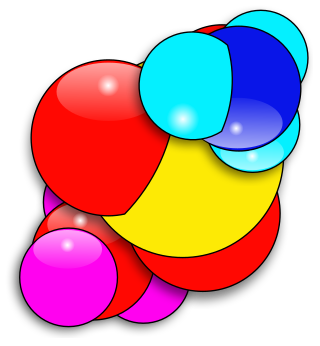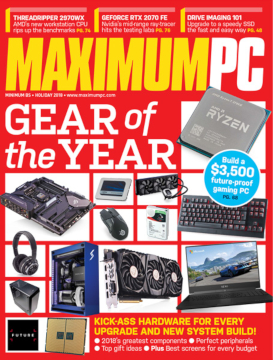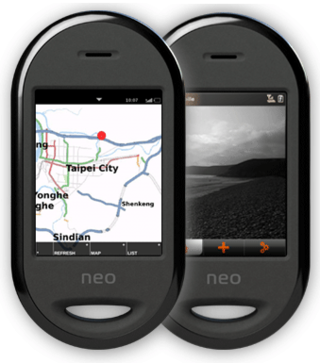Related Research Articles
Psion Organiser was the brand name of a range of pocket computers developed by the British company Psion in the 1980s. The Organiser I and Organiser II had a characteristic hard plastic sliding cover protecting a 6×6 keypad instead of a computer keyboard, with letters arranged alphabetically.
GROMACS is a molecular dynamics package mainly designed for simulations of proteins, lipids, and nucleic acids. It was originally developed in the Biophysical Chemistry department of University of Groningen, and is now maintained by contributors in universities and research centers worldwide. GROMACS is one of the fastest and most popular software packages available, and can run on central processing units (CPUs) and graphics processing units (GPUs). It is free, open-source software released under the GNU General Public License (GPL), and starting with version 4.6, the GNU Lesser General Public License (LGPL).
To be used efficiently, all computer software needs certain hardware components or other software resources to be present on a computer. These prerequisites are known as (computer) system requirements and are often used as a guideline as opposed to an absolute rule. Most software defines two sets of system requirements: minimum and recommended. With increasing demand for higher processing power and resources in newer versions of software, system requirements tend to increase over time. Industry analysts suggest that this trend plays a bigger part in driving upgrades to existing computer systems than technological advancements. A second meaning of the term system requirements, is a generalisation of this first definition, giving the requirements to be met in the design of a system or sub-system.

Folding@home is a distributed computing project aimed to help scientists develop new therapeutics for a variety of diseases by the means of simulating protein dynamics. This includes the process of protein folding and the movements of proteins, and is reliant on simulations run on volunteers' personal computers. Folding@home is currently based at the University of Pennsylvania and led by Greg Bowman, a former student of Vijay Pande.
The System Management Bus is a single-ended simple two-wire bus for the purpose of lightweight communication. Most commonly it is found in chipsets of computer motherboards for communication with the power source for ON/OFF instructions. The exact functionality and hardware interfaces vary with vendors.

Maximum PC, formerly known as boot, is an American magazine and website published by Future US. It focuses on cutting-edge PC hardware, with an emphasis on product reviews, step-by-step tutorials, and in-depth technical briefs. Component coverage areas include CPUs, motherboards, core-logic chipsets, memory, videocards, mechanical hard drives, solid-state drives, optical drives, cases, component cooling, and anything else to do with recent tech news. Additional hardware coverage is directed at smartphones, tablet computers, cameras and other consumer electronic devices that interface with consumer PCs. Software coverage focuses on games, anti-virus suites, content-editing programs, and other consumer-level applications.

The C-One is a single-board computer (SBC) created in 2002 as an enhanced version of the Commodore 64, a home computer popular in the 1980s. Designed by Jeri Ellsworth and Jens Schönfeld from Individual Computers, who manufactured the boards themselves, the C-One has been re-engineered to allow cloning of other 8-bit computers.

Ars Technica is a website covering news and opinions in technology, science, politics, and society, created by Ken Fisher and Jon Stokes in 1998. It publishes news, reviews, and guides on issues such as computer hardware and software, science, technology policy, and video games.
The HKGolden is an Internet forum for topics related to computer hardware and software among Internet users in Hong Kong in the early 2000s. HKGolden has become an Internet community. The forum is a part of HKGolden.com, a computer information portal named after the Golden Computer Centre – a shopping centre of computer products in Sham Shui Po, Kowloon, Hong Kong. Since 2006, it has become a popular and general platform for all Hong Kong netizen. It was the concentration platform of funny and satirical derivative works. However, due to the poor management of the administrators, many users have left in 2016.
Steve Capps is a pioneering American computer programmer and software engineer, who was one of the original designers of the Apple Macintosh computer and co-designers of the Finder in the 1980s. He also led development of the Apple Newton PDA and designed music software such as SoundEdit, before developing user interface (UI) designs for Microsoft's Internet Explorer and online/mobile payment systems.
The Intel Graphics Media Accelerator (GMA) is a series of integrated graphics processors introduced in 2004 by Intel, replacing the earlier Intel Extreme Graphics series and being succeeded by the Intel HD and Iris Graphics series.
Jiangsu Lemote Tech Co., Ltd or Lemote is a computer company established as a joint venture between the Jiangsu Menglan Group and the Chinese Institute of Computing Technology, involved in computer hardware and software products, services, and projects.

The Parallax P8X32A Propeller is a multi-core processor parallel computer architecture microcontroller chip with eight 32-bit reduced instruction set computer (RISC) central processing unit (CPU) cores. Introduced in 2006, it is designed and sold by Parallax, Inc.

The Pepper Pad was a family of Linux-based mobile computers with Internet capability and which doubled as a handheld game console. They also served as a portable multimedia device. The devices used Bluetooth and Wi-Fi technologies for Internet connection. Pepper Pads are now obsolete, unsupported and the parent company has ceased operations.

The Chumby was a consumer electronics product formerly made by Chumby Industries, Inc. It is an embedded computer which provides Internet and LAN access via a Wi-Fi connection. Through this connection, the Chumby runs various software widgets. In 2010 Sony introduced a single product based on an offshoot version of Chumby, the Sony Dash.

Openmoko is a discontinued project to create a family of mobile phones that are open source, including the hardware specification, the operating system, and actual smartphone development implementation like the Neo 1973 and Neo FreeRunner. The whole project was sponsored by Openmoko Inc.

Phoronix Test Suite (PTS) is a free and open-source benchmark software for Linux and other operating systems. The Phoronix Test Suite, developed by Michael Larabel and Matthew Tippett, has been endorsed by sites such as Linux.com, LinuxPlanet, and Softpedia.

In computer science and computer engineering, computer architecture is a description of the structure of a computer system made from component parts. It can sometimes be a high-level description that ignores details of the implementation. At a more detailed level, the description may include the instruction set architecture design, microarchitecture design, logic design, and implementation.

μTorrent, or uTorrent, is a proprietary adware BitTorrent client owned and developed by Rainberry, Inc. The "μ" in its name comes from the SI prefix "micro-", referring to the program's small memory footprint: the program was designed to use minimal computer resources while offering functionality comparable to larger BitTorrent clients such as Vuze or BitComet. μTorrent became controversial in 2015 when many users unknowingly accepted a default option during installation which also installed a cryptocurrency miner.
Data center management is the collection of tasks performed by those responsible for managing ongoing operation of a data center. This includes Business service management and planning for the future.
References
- ↑ "Om SweClockers".
- ↑ "Om SweClockers".
- ↑ "Forums Rankings - all software forums, Swedish language, website ranking by posts". Archived from the original on 15 February 2009. Retrieved 30 January 2009.
- ↑ Stanford University 2009-01-30